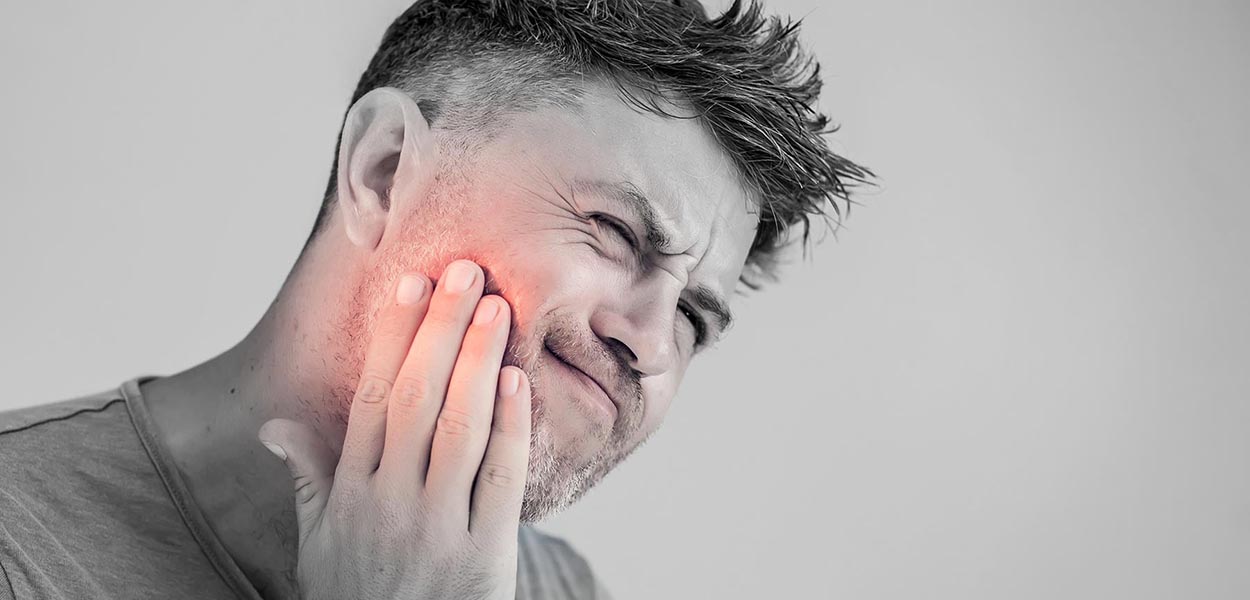Everything You Need to Know About TMJ

What is TMJ Disorder?
TMJ Disorder creates jaw and bite alignment problems in people who suffer from it. The temporomandibular joint is a hinge and gliding joint that is one of the most used joints in our body. Patients who suffer from TMJ problems will experience clicking of the jaw at the joints, jaw and/or facial pain, headaches, earaches, locking of the jaw, worn teeth and ringing in the ears.
Who can suffer from TMJ?
TMJ problems can happen to anyone, but are more common in women. In fact, it affects nearly twice as many women as men, especially women during childbearing age. It can be caused by an improper bite, arthritis, jaw dislocation or an injury. Stress is also a significant factor in TMJ disorder.
Can TMJ worsen during pregnancy or child-bearing years?
Some research on TMJ indicates that women during child-bearing years are more likely to experience TMJ problems. TMJ has been linked to magnesium deficiency, and during menstruation, a woman may also experience vitamin deficiencies. Women who take oral contraceptives are also more prone to jaw pain.
Why does TMJ cause headaches and earaches?
Ear and head pain caused by TMJ can be a dull, irritating pain, or a searing, sharp pain. It can worsen when you move your jaw, whether to speak, eat or yawn. This pain can be caused by a few things. First, overuse of the jaw – if you suffer from TMJ and spend your day chewing gum, for instance, you may notice head or ear pain. If your TMJ is the result of an improper bite, this can also lead to headaches and earaches. Many patients with TMJ also grind their teeth, which can be a source of additional pain. Many headaches can be misdiagnosed as tension headaches rather than headaches associated with TMJ, so getting a proper diagnosis is important.
Who diagnoses TMJ?
A dentist or an orthodontist can diagnose your TMJ. An orthodontist may be the best to form a proper diagnosis, however, because of his extensive study of how the face and jaw work together.
What are the treatment options for TMJ?
Orthodontics is one common treatment option for patients suffering from TMJ. IF the source of the pain stems from a bad bite, orthodontic treatment can correct the malocclusion and ensure the jaw can work properly. Ensuring a proper bite can ensure that the jaw is working in an ideal manner and not compensating for misaligned teeth.
Mouthguards or splints may also be an option, especially for patients who grind their teeth. The guard will work to protect your teeth.
Some patients may find relief from over-the-counter pain medications or muscle relaxers, but these will only provide short-term relief and are not a solution to the underlying issues.
Patients who have stress-induced TMJ may benefit from counseling and stress relieving exercises. Some patients, however, may only find relief through surgical procedures.
What is TMJ surgery and who performs it?
If surgery is indicated, your dentist or orthodontist can refer you to an oral and maxillofacial surgeon. When non-surgical options cannot provide relief, a patient may consider surgery.
Arthroscopic surgery can allow the surgeon to visualize the joint, remove any adhesions, smooth out irregularities, and inject steroids directly into areas that are inflamed.
If scans show extreme damage, the surgeon may need to surgically open the joint. There will be extensive rehab after the surgery. TMJ surgery can be effective to correct jaw position and relieve pain, however, it is an extensive surgery and should be considered a last resort when other treatments and therapies do not work.
When does tmj hurt the most
Pain or soreness in the jaw may be most prevalent in the morning or late afternoon. Pain often found in the morning can be attributed to holding the jaw in an improper position all night, or bruxism (grinding of the teeth). Pain that elevates later in the day can be associated with overuse or misuse, such as opening the jaw too wide, throughout the day.
When does TMJ develop?
TMJ can develop at any time, but is most common in patients ages 20-40, and affects more women than men. TRauma to the jaw or jaw joint may also trigger TMJ disorder.
How does TMJ affect eating?
Jaw pain can make eating difficult and painful. If you suffer from TMJ, it is a good idea to stick to soft foods. Patients suffering from TMJ may be unable to open their mouths all the way or may experience pain while chewing. Patients should avoid eating anything too chewy or hard, as this can aggravate TMJ pain.
IF TMJ pain doesn’t allow you to open your jaw wide, it can make eating things like large sandwiches or burgers difficult. It can be helpful to cut food into bite sized pieces that accommodate how far you can open your jaw.
The TMJ Association recommends anti-inflammatory foods, such as fish high in Omega-3, and dark, leafy greens. Patients should be sure to eat a vitamin rich diet, paying close attention to increasing their magnesium, vitamin C and vitamin E intake.
Can TMJ affect your sleep?
You sleep position at night can actually affect your TMJ issues. Sleeping on your stomach or side can put additional pressure on the joint, moving it even further out of alignment. Sleeping on your back is the best position to relieve TMJ symptoms during the night. If you also suffer from bruxism associated with your TMJ, consult with an orthodontist about a mouth guard or splint to use at night to prevent tooth grinding.
When should I seek medical care for my TMJ?
If you suffer from frequent or chronic headaches or earaches, consistent jaw pain, clicking of the jaw, the inability to open your jaw all the way, or difficulty chewing or swallowing, you should consult with a medical professional. If your jaw locks, you should seek immediate medical care at an emergency room.
When is TMJ serious?
TMJ may be simply annoying at first, but if left untreated, it can escalate and lead to other issues. Constant pain, as well as bruxism, can lead to abnormal sleep and insomnia. Because eating can be painful, untreated TMJ can also lead to malnutrition and eating problems. Intense headaches, earaches, neck and shoulder pain can impact your quality of life.
What are the effects of TMJ on hearing?
TMJ can cause ringing in the ears and earaches. Patients with untreated TMJ may experience muffled hearing, and could even experience hearing loss.
The ear is affected by TMJ because of its proximity to the joint – swelling and inflammation of the jaw can carry on to the ear. The inflammation can cause the eustachian tubes to become blocked, which can make the ears feel plugged and even painful.
Swelling and inflammation of the TMJ can also affect the nerves of the ear, signalling something is wrong and causing problems with hearing.
For some people, ear problems caused by TMJ may be misdiagnosed. If you continue to suffer from muffled hearing or earaches that don’t have another explanation, consult with a dentist or orthodontist.
How long does TMJ last?
How long TMJ problems last differs from person to person. For some, it may only be a few weeks, for instance if a jaw injury has occurred. For some, pain can last for years, especially if the issue hasn’t been properly diagnosed. If you suffer from any of the symptoms commonly associated with TMJ, it is important to get a proper diagnosis so treatment can help relieve pain and side effects.
Is TMJ treatment covered by insurance/ which insurance covers tmj?
You may run into issues getting TMJ treatment covered by insurance because many insurance companies can’t decide if TMJ should be covered by medical or dental, and there isn’t a huge concensus on the best way to treat TMJ. There are some treatments that can be considered medically necessary to alleviate TMJ, however, not all insurances may cover the treatments.
Before beginning treatment, it is important to speak with your insurance company, both medical and dental, to see what treatments they will cover. Your dentist or orthodontist will also have a person on staff who can help ensure you receive the most from your insurance benefits and help file claims on your behalf.
When is jaw clicking a sign of TMJ?
A clicking sound or feeling when you open your jaw can be an indication of a TMJ issue. If your jaw consistently pops or clicks, you should consult your dentist or orthodontist right away, even if there is no pain associated with it. If left untreated, TMJ symptoms can worsen, leading to additional problems.
Where are TMJ headaches localized?
Many headaches associated with TMJ are misdiagnosed as tension headaches. HEadaches associated with TMJ can cause pain in the forehead or temples, and can sometimes be confused with a sinus or allergy issue. TMJ problems can cause shooting pains up the back of the head, and even cause the scalp to be sensitive.
Can you develop tmj due to wisdom teeth?
Wisdom teeth can lead to TMj pain, but it is very rare. Impacted wisdom teeth can cause jaw pain, which can also travel up to the ear and head, leading you to believe you may be suffering from TMJ.
Are there tmj exercises to relieve pain?
Gently stretching your jaw may help relieve some pain, and can also help prevent the pain from returning. Slowly open your mouth as wide as you can, and hold it open for a few seconds. Then, slowly close it again. You can also stretch your jaw from side to side.
If your TMJ may be stress induced, relaxation exercise may be helpful. Gentle breathing exercises will help relieve tension.
Can TMJ cause neck pain, or pain near my chin?
Yes, the pain from TMJ can travel to your neck or chin. The most common symptoms are pain in the face, jaw, head, neck, shoulder and ears.
Can a chiropractor relieve my TMJ?
Some believe that chiropractic adjustments to the spine in the upper back and neck can relieve TMJ symptoms. However, Dr. Stosich does not believe this will be effective in the long run, as TMJ is pain is associated with a misaligned bite.
Do I have TMJ or an ear infection or sinus infection?
Inflammation caused by TMJ can lead to severe ear pain, and if you are unaware that you have TMJ, it can be baffling to you and even your physician as to what has caused the ear pain. The most common cause of ear pain in adults is actually TMJ.
Likewise, TMJ can create pain in the face, neck and head that can mimic a sinus infection. IF you continue to experience symptoms similar to this, consult with a dentist or orthodontist.
Do you suffer from tmj or a toothache?
Tooth pain is a common symptom associated with TMJ. When the jaw joint is misplaced, as happens with TMJ, you may have a toothache because of the way the teeth are fitting together. Many people who suffer from TMJ also clench or grind their teeth, which can cause tooth pain.
Why does TMJ feel like there is something in my throat?
Muscle spasms, related to TMJ, can result in the feeling of something being stuck in your throat. Consult with a specialist if this is a symptom for you.
How does TMJ affect the nerves?
Closely related to TMJ are the Trigeminal nerves. These include the ophthalmic nerve, which allows for sensation of the eyes, nose, eyebrows and forehead; the maxillary nerve, which allows for sensation in the nasal cavity, sinuses, palate and upper jaw; and the mandibular nerve, which allows for sensation in your lower jaw. These nerves, just as TMJ, can become disorder, creating a condition called Trigeminal Neuralgia, which is often confused with TMJ.
Which types of doctor can diagnose TMJ?
A doctor, dentist or orthodontist can diagnose TMJ disorders. Because TMJ affects the function of the bite, an orthodontist is ideal to diagnose and assist with TMJ problems.
How can I get rid of TMJ?
There are several ways you can lessen TMJ pain and find relief.
First, is by practicing stress management and relaxation techniques. If your TMJ is stress induced, these techniques can be of great help.
Devices, such as a splint or mouthguard, may also help you find relief. These will position the jaw correctly, helping to ease painful symptoms associated with TMJ.
Medication, such as muscle relaxers or anti-inflammatories, may also provide relief.
Orthodontic treatment can also help, as it can correctly position the jaw, providing an ideally functioning bite.
How can you unlock your jaw affected by TMJ?
The first thing a patient should do if a jaw becomes locked is relax. Tensing up can cause the lock to get worse, so try to calm yourself and relax. If the lock continues, apply gentle, moist heat to help release the joint. Wiggling, even if only a small movement is first made, can also help.
If the lock continues and cannot be helped by these methods, call your specialist.
What other conditions are related to TMJ?
TMJ can be related to a host of other issues, such as immune system deficiencies and digestion. For stress induced TMJ, clenching and grinding of the teeth is a signal to the body that something is wrong, resulting in a compromised immune system. TMJ can have a negative effect on eating and digestion because chewing can be painful.
TMJ is more common in people who already suffer from chronic pain conditions, such as fibromyalgia, chronic fatigue syndrome, and irritable bowel syndrome. Researchers have proposed that if someone already suffers from some form of chronic pain, the body can be at risk for additional pain. Some researchers believe that when the body is dealing with chronic pain in one area, it may alter the body’s natural pain-killing response, opening the body to be more susceptible to pain in other areas.
TMJ can also be the source of tinnitis or vertigo. Inflammation of the TMJ can travel to the ear canal, leading to a ringing sound and causing dizziness and vertigo.
Are TMJ and snoring related
Snoring occurs because of narrowed air passages, which can be worsened in patients who suffer from TMJ. TMJ patients may clench their teeth at night, closing off the airway, leading to snoring.


